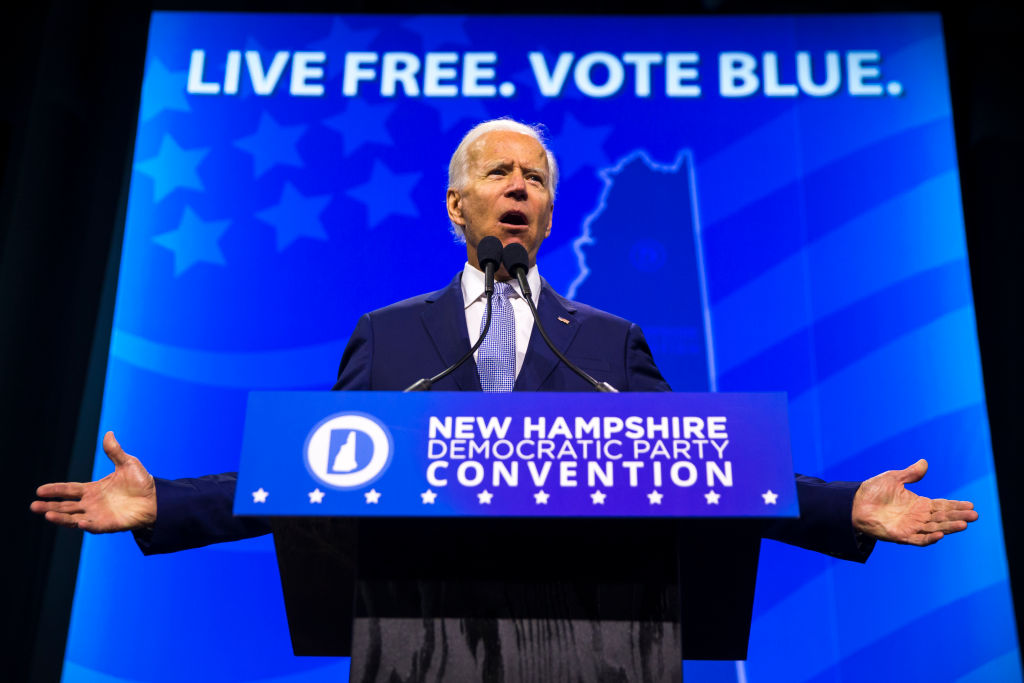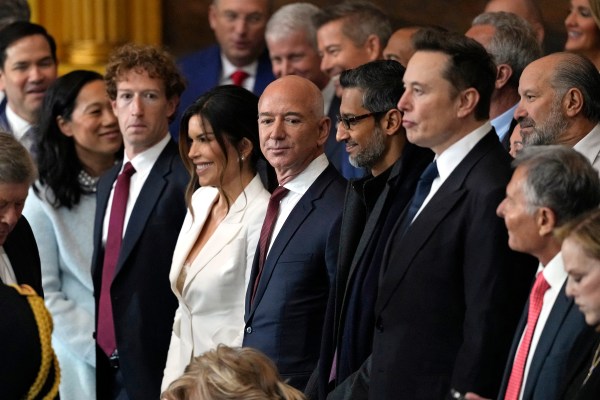Happy Wednesday! A programming note before we begin: Our plan for this newsletter is to start (relatively!) slow, then speed up as the campaign season intensifies. Off the bat, that will mean two editions a week—so we’ll see you in your inbox again next Monday. We’d appreciate it if you all tried to avoid breaking any important political news, like, this afternoon.
Up to Speed
- Nikki Haley is running for president. The Post and Courier reported Tuesday that the former South Carolina governor and U.N. ambassador will officially launch her campaign February 15 at an event in Charleston. Haley will join Donald Trump on the early GOP candidate slate—less than two years after telling the Associated Press that she wouldn’t run if he did.
- Mitch Daniels is not running for Senate. The former Indiana governor and Purdue University president, who said publicly in recent weeks he was considering running for retiring Sen. Mike Braun’s seat, told Politico Tuesday that “it’s just not the job for me, not the town for me, and not the life I want to live at this point.” Daniels’ decision simplifies the path to the nomination for Rep. Jim Banks, who is being endorsed—as David M. Drucker reported after Daniels’ announcement Tuesday—by the National Republican Senatorial Committee.
- Republican Gov. Jim Justice of West Virginia told a local TV station Monday that he’s leaning toward challenging Democratic Sen. Joe Manchin in 2024. “I’ve given it a lot of thought and I’m still very, very, very seriously considering it,” said Justice, the 71-year-old former Democrat who became a Republican in 2017. “In fact, you know, I’m probably leaning that way.” Manchin sealed his reputation as a legendary political survivor when he won reelection in 2018, two years after Donald Trump carried the state by 42 points, but Justice would be by far his most formidable challenger to date.
- Rep. George Santos—the freshman New York Republican who has become an object of public fascination since it came to light that he had seemingly fabricated practically every detail of his political biography—has agreed to step back from House committee assignments, at least for the present.
Clashing Over New Hampshire
We don’t mean to alarm you, but it’s already February—which means the first 2024 presidential primaries are just a year away. And while we still don’t know all the candidates who will be running in those primaries, the political fights surrounding them are already well underway.
Democratic officials convene tomorrow in Philadelphia for this weekend’s Democratic National Committee Winter Meeting. A top order of business: officially approving the primary-calendar shakeup proposed last year by President Joe Biden.
The proposal, which was approved by the DNC’s Rule and Bylaws Committee in December, would scramble the one-two punch of Iowa and New Hampshire that has kicked off the U.S. presidential season for both parties for half a century. Under the new calendar, South Carolina would be first out of the gate on February 3, 2024, followed by Nevada and perhaps New Hampshire (more on that below) on February 6, Georgia on February 13, and Michigan on February 27.
Some Democrats have favored revisiting the calendar for years, arguing that Iowa and New Hampshire do not reflect the diversity of the modern party. And there are political considerations too: The states certainly weren’t kind to Biden in 2020, when he finished fourth in Iowa and fifth in New Hampshire before finding his sea legs in South Carolina.
While this weekend’s vote is expected to be approved without a hitch, implementation will be another matter. These days, most party primaries are administered by the states themselves, and Iowa and New Hampshire—both of which have Republican governors and secretaries of state—have made it clear they have no interest in upending their schedules to suit the preferred voting order of the DNC.
“Biden says he’s taking it to South Carolina—believe you me, candidates on the Democratic side are coming to New Hampshire,” Gov. Chris Sununu told the Dispatch Podcast this week. “Because we’re going first whether they like it or not. Our law says we are.”
Iowa Democrats, while quick to extol the merits of their caucus system, have to admit there are few reasons for the party to continue to prioritize them. Once purple, the state has been getting redder for years, and the 2020 caucuses were a national party embarrassment: A malfunctioning app delayed reporting of the results for days.
But the same can’t be said for New Hampshire. “New Hampshire is a true battleground state,” state party chair Ray Buckley wrote in a December letter to the DNC. “And—despite having a nearly even split between registered Democrats and Republicans—[New Hampshire] has produced favorable results for federal Democrats in some of the toughest of electoral environments.” Buckley pointed out that New Hampshire has broken narrowly for the blue team in the last five presidential elections, four of the last five Senate elections, and 16 of the last 18 House elections.
“Republicans have already started blaming Democratic leadership for New Hampshire losing its First-in-the-Nation primary and touting the GOP as the only party who cares about Granite Staters,” Buckley wrote. “With the close nature of presidential elections, that will needlessly jeopardize four critical electoral votes in this battleground state.”
New Hampshire’s new Republican Party chair Chris Ager, who was elected at the state party meeting last weekend, shares that assessment. “It will definitely hurt the Democrats in New Hampshire,” he told The Dispatch. “All politics is local, and the DNC is disrespecting our state.”
On paper, the new DNC schedule doesn’t push New Hampshire back far—although pushing any state in front of it would violate state law. But the DNC also plans to require New Hampshire to change some of its state voting laws to qualify even for the second primary spot. State Democrats have described this as a “poison pill” provision, as Democrats don’t control the state legislature. Barring those changes, the DNC would revoke New Hampshire’s “early state” waiver, meaning it would require the state to wait to hold its primary until March.
New Hampshire’s two Democratic senators, Maggie Hassan and Jeanne Shaheen, have both denounced the changes, although neither has deployed their most powerful weapon—threatening to withhold key votes in the 51-49 Senate over Biden’s plan. (Hassan and Shaheen did not respond to requests for comment.)
“There are two Democratic senators sitting there, they have all the leverage in the world to say ‘this ain’t gonna happen,’ and they’re not using it,” Sununu told The Dispatch. “They’re like terrible used-car salesmen—they don’t know how to make a pitch.”
Since Sununu and company won’t move the primary, state Democrats have two options. They could cave to the national party’s demands by setting up their own separate party-run primary or caucus later in the cycle, which would require significant investments of manpower and money. Or they could simply proceed with their primary as scheduled, daring the DNC to punish them by refusing to seat their delegates at next year’s party convention.
Whether the prospect of losing a little procedural power will be enough to outweigh state operatives’ ferocious dedication to the first-in-the-nation status remains to be seen.
“If Democrats are serious about having a process where they’re reexamining and plugging in new competitive and diverse states in the first four or five for 2028, then they’ve got to find a way to break Iowa and New Hampshire’s will,” political scientist Josh Putnam, an expert on the presidential nominating process, told The Dispatch. “And the stakes are far lower in a cycle where … any Democrat is seeking renomination than if it was competitive. So this is their chance, one could argue.”
Tom Cotton’s Quiet Push for Jim Banks
In the days leading up to Mitch Daniels’ decision to skip a Senate bid and the NRSC’s subsequent endorsement of Rep. Jim Banks, Banks had a key ally in his corner working quietly to effect both outcomes: Sen. Tom Cotton.
The Arkansas Republican endorsed Banks on Jan. 17, within minutes of the congressman launching his campaign. At the time, Daniels, 73, was knee-deep in what turned into a very public process of exploring a run—an exercise that culminated last week with a visit to Capitol Hill to discuss the matter with top Senate Republicans. Daniels was an intriguing potential candidate: Former Purdue University president; former Indiana governor; former official in the George W. Bush administration; fiscal hawk, consensus-builder. Especially for that segment of the GOP hoping to shift the party away from the influence of former President Donald Trump, Daniels was compelling.
But Cotton believed a Daniels candidacy would make it harder for Republicans to win back the Senate majority in 2024. He went about lobbying for Banks, telling Republican colleagues the 43-year-old congressman was broadly acceptable to all factions of the party and a proven vote-getter. Backing Banks, Cotton said, would prevent a crowded, divisive red-state primary, allowing Republicans to devote attention and resources to Democrat-held battlegrounds.
Over the course of several conversations—particularly with Senate Minority Leader Mitch McConnell, Senate Minority Whip John Thune, NRSC Chairman Steve Daines, and Sen. John Cornyn—Cotton made his case for Banks. Simultaneously, he encouraged them not to give Daniels “false hope” that financial and organizational backing was in the offing from the NRSC or the Senate Leadership Fund, the McConnell-aligned super PAC.
For now, Banks is the only declared GOP contender in the primary to succeed Sen. Mike Braun—though several other Republicans have signaled interest in running, including Gov. Eric Holcomb and Rep. Victoria Spartz. But any other candidate would have an uphill climb against Banks, who now has the backing of the NRSC, the influential Club for Growth, and as of today, Trump
2024 Senate Map Strongly Favors Republicans
With ruby-red Indiana unlikely to face a bruising GOP primary, Senate Republican leaders will be able to concentrate on this cycle’s unusually large sea of Democrat-held battlegrounds. While Republicans are only defending 11 Senate seats in 2024—most of them in very safe states—Team Blue will be playing defense in twenty-three states, including Michigan, Wisconsin, Montana, West Virginia, Pennsylvania, Ohio, and Nevada.
Making matters worse for Democrats, this particularly Republican-friendly map falls in a presidential cycle. In our era of nationalized politics and deep polarization, it’s become vanishingly rare for states that vote for one party’s presidential candidate to elect a senator from the other party on the same ballot.
“2016 was the first Senate election since the popular vote era started in 1914 where every state that had a Senate election voted in the exact same way for president and Senate,” said J. Miles Coleman, an election analyst for Sabato’s Crystal Ball. “And 2020 wasn’t much better, because only Republican Sen. Susan Collins won a state that her presidential nominee did not carry.”
This trend poses the biggest challenge for the three Democratic senators running for reelection in states Trump won in 2020: Sens. Sherrod Brown of Ohio (Trump +8), Jon Tester of Montana (Trump +16), and Joe Manchin of West Virginia (Trump +39).
Sabato’s Crystal Ball rates West Virginia as the GOP’s strongest takeover opportunity, whether or not Manchin retires. “With or without Manchin, it probably goes to the Republicans,” Coleman said.
Another headache for Democratic leaders this cycle is Arizona Sen. Kyrsten Sinema, who recently left the party to register as an independent, though she continues to caucus with the Democrats. Assuming Sinema runs for reelection, Democrats will have to choose whether to endorse her anyway or throw their weight behind a more progressive option like Rep. Ruben Gallego, her only official challenger to date. The Republican primary field is expected to heat up soon.
Then there are the GOP stretch states like Michigan, where four-term Democratic Sen. Debbie Stabenow is retiring. No Republican has won a Senate race in Michigan since 1994, but it is still a battleground, as Trump demonstrated when he narrowly won the state in 2016. (Biden carried it by three points in 2020.) Senate Democrats haven’t exactly run away with statewide victories in recent cycles: two-time GOP Senate nominee John James lost to Stabenow by roughly 6.5 points in 2018—an unremarkable margin for that year’s blue wave—and lost again to Sen. Gary Peters by just under two points in 2020.
As potential Republican contenders like Rep. Lisa McClain wait in the wings, one strong Democratic recruit is reportedly building a Senate campaign team. Rep. Elissa Slotkin, a self-styled moderate who won a hotly contested reelection race this cycle, is widely seen as a strong contender should she jump in.
“She’s got a good profile and obviously she’s a formidable fundraiser,” said Jason Cabel Roe, a GOP strategist who ran Slotkin challenger Tom Barrett’s campaign in 2022. “Her centrist image—regardless of how inauthentic I might find it—fits the state’s politics.”
Eyes on the Trail
- Iowa spies Tim Scott: South Carolina Sen. Tim Scott will headline a Polk County GOP dinner in Iowa, Fox News’ Paul Steinhauser reports, another sign that the prospective presidential candidate is making moves in one of the Republican Party’s early nominating states ahead of the 2024 election.
- Swapping the thumb for the whole mitten? GOP Rep. Lisa McClain of Michigan told The Dispatch on Monday that she’s weighing a bid for retiring Democratic Sen. Debbie Stabenow’s seat: “Yes, I’m considering it.” McClain emphasized that she’s in no rush to decide and has yet to schedule any meetings with Senate leadership about her viability as a candidate. Should she run for Senate, she’d be giving up a nice gig in the lower chamber as the House GOP’s newly elected conference secretary and a sitting member on several high-profile House committees, including Armed Services and Oversight and Accountability.
- Feinstein’s campaign running on fumes: “California Senator Dianne Feinstein said she will announce whether to run for her seat in the spring. Donors are already saying she won’t,” Bloomberg’s Laura Davison reports. “The 89-year-old Democrat raised just $558.91 over the last three months and has less than $10,000 in cash in the bank, according to a Federal Election Commission filing released Tuesday.”
Notable and Quotable
“He is recusing himself until he is cleared. Please note that his seat will be reserved until the congressman has been cleared of both campaign and personal financial investigations.”
—Statement from Rep. George Santos’ office on his recusal from congressional committees, Tuesday, January 31
Let Us Know
What do you make of Mitch Daniels’ decision to opt out of a Senate run?








Please note that we at The Dispatch hold ourselves, our work, and our commenters to a higher standard than other places on the internet. We welcome comments that foster genuine debate or discussion—including comments critical of us or our work—but responses that include ad hominem attacks on fellow Dispatch members or are intended to stoke fear and anger may be moderated.
With your membership, you only have the ability to comment on The Morning Dispatch articles. Consider upgrading to join the conversation everywhere.